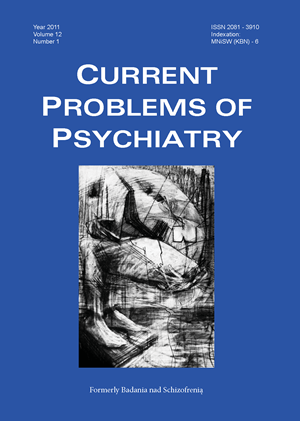Rola inhibitorów acetylocholinesterazy w leczeniu zespołów otępiennych
Słowa kluczowe:
inhibitory acetylocholin esterazy, zespół otępiennyAbstrakt
Progressive or persistent deficit of cognitive functions is the core clinical symptom of dementia. It is characterized by deterioration of memory mainly, but also other cognitive functions such as language skills, the presence of apraxia, agnosia and impaired spatial orientation. Advances in research in the last years contributed to creating new diagnostic and therapeutic guidelines in Alzheimer disease and other dementive syndromes. Despite the presence of extensive research on basic treatment in Alzheimer disease, from practical point of view 3 acetylocholinesterase inhibitors are important and NMDA-receptor antagonist-memantine. The use of these drugs is still controversial and raises many questions such as: when to start treatment, how effective the drugs are and how can we increase its effectiveness. We do not have univocal data confirming the use of drugs in mild cognitive impairment, and studies on the preventive action of ACE inhibitors are not very clear. In order to increase drug efficacy we need to consider new forms of drugs and combined treatment. The article presents the most important data on acetylocholinesterase inhibitors and their use in clinical practice.
Bibliografia
1. Fratiglioni L., Grut M., Forsell Y., Viitanen M., Grafström M., Holmén K., Ericsson K., Bäckman L., Ahlbom A., Winblad B. Prevalence of Alzheimer;s disease and other dementias in an elderly urban population: relationship with age, sex and education. Neurology 1991; 41: 1886-1892.
2. Davies K.L., Maloney A.J. Selective loss of central cholinergic neurons in Alzheimer;s disease. Lancet, 1976; 2: 1403-1409.
3. Shapiro M. Plasticity, hipocampal place cells and cognitive maps. Arch. Neurol., 2001; 58: 874-881.
4. Francis P.T., Palmer A.M., Snape M., Wilcock G.K. The cholinergic hypothesis of Alzheimer’s disease: a review of progress. J. Neurol. Neurosurg. Psychiatry, 1999; 66: 137-147.
5. Aguglia E., Onor M.L., Saina M., Maso E. An open label comparative study of rivastigmine, donepezil and galantamine in a real world setting. Curr. Med. Res. Opin., 2004; 11: 1747-1752.
6. Pakrasi S., Mukaetowa-Ladinska E.B., McKeith I.G., O’Brien J.T. Clinical predictors of response to Acetyl Cholinesterase Inhibitors: experience from routine clinical use in Newcastle. Int. J. Geriatr. Psychiatry, 2003; 18 879-886.
7. Lemstra A., Eikelenboom P., van Gool W.A. The cholinergic deficiency, syndrome and its therapeutic implications. Gerontology, 2003; 49: 55-60.
8. Giacobini E. Cholinesterases: new roles in brain function and in Alzheimer’s disease. Neurochem. Res., 2003; 28: 515-522.
9. Gauthier S., Ballard C. Symptomatic treatment for dementia. In: Gauthier S, Ballard C. Management of dementia. 2nd Ed. New York, Lundbeck Institute; 2009, p. 73-86.
10. Winblad B., Kilander L., Erikson S. Minthon L., Båtsman S., Wetterholm A.L., Jansson-Blixt C., Haglund A. Severe Alzheimer’s disease Study Group. Donepezil in patients with severe Alzheimer’s disease: double-blind parallel-group, placebo controlled study. Lancet, 2006; 367: 1057-1065.
11. Wentrup A., Oertel W.H., Dodel R. Once-daily transdermal rivastigmine in the treatment of Alzheimer's disease. Drug Des. Devel. Ther., 2009; 6(2): 245-254.
12. Sadowsky C.H., Dengiz A., Olin J.T., Koumaras B., Meng X., Brannan S. US38 study group. Switching from donepezil tablets to rivastigmine transdermal patch in Alzheimer's disease. Am. J. Alzheimers Dis. Other Demen., 2009; 24(3): 267-275.
13. Cummings J.L. Use of cholinesterase inhibitors in clinical practice: evidence-based recommendations. Am. J. Geriatr. Psychiatry, 2003;11: 131-145.
14. Lefèvre G., Sedek G., Jhee S.S., Leibowitz M.T., Huang H.L., Enz A., Maton S., Ereshefsky L., Pommier F., Schmidli H., Appel- Dingemanse S. Pharmacokinetics and pharmacodynamics of the novel daily rivastigmine transdermal patch compared with twicedaily capsules in Alzheimer's disease patients. Clin. Pharmacol. Ther., 2008; 83(1): 106-114.
15. Imbimbo B.P. Pharmacodynamic-tolerability relationships of cholinesterase inhibitors for Alzheimer’s disease. CNS Drugs, 2001; 15: 375-390.
16. Winblad B., Grossberg G., Frölich L., Farlow M., Zechner S., Nagel J., Lane R. IDEAL: a 6-month, double-blind, placebo-controlled study of the first skin patch for Alzheimer disease. Neurology, 2007; 69(4 Suppl 1): S14-22.
17. Cummings J., Winblad B. A rivastigmine patch for the treatment of Alzheimer's disease and Parkinson's disease dementia. Expert Rev. Neurother., 2007; 7: 1457-1463.
18. Winblad B., Kawata A.K., Beusterien K.M., Thomas S.K., Wimo A., Lane R., Fillit H., Blesa R. Caregiver preference for rivastigmine patch relative to capsules for treatment of probable Alzheimer's disease. Int. J. Geriatr. Psychiatry, 2007; 22: 485-491.
19. Cummings J., Lefevre G., Small G., Appel-Dingemanse S. Pharmacokinetic rationale for the rivastigmine patch. Neurology, 2007; 69: S10-S13.
20. Tariot P.N., Farlow M.R., Grossberg G.T., Graham S.M., McDonald S., Gergel I. Memantine treatment in patients with moderate to severe Alzheimer disease already receiving donepezil: a randomized controlled trial. JAMA, 2004; 291: 317-324.
21. Raina P., Santaguida P., Ismaila A., Patterson C., Cowan D., Levine M., Booker L., Oremus M. Effectiveness of cholinesterase inhibitors and mementine for treating dementia: evidence review for a clinical practice guideline. Ann. Int. Med., 2008; 5: 379-397.
Pobrania
Opublikowane
Numer
Dział
Licencja
Prawa autorskie (c) 2011 Autorzy

Praca jest udostępniana na licencji Creative Commons Attribution-NonCommercial-NoDerivatives 3.0 Unported License.


